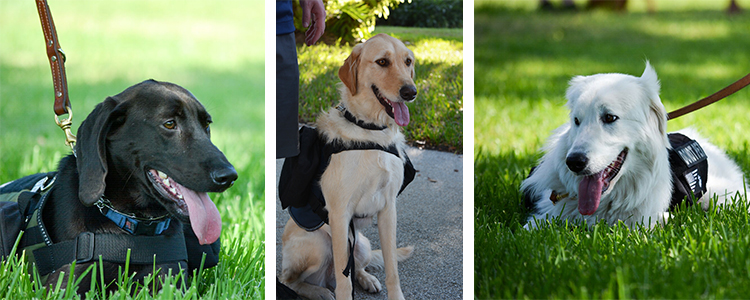
Service Dogs Help Veterans with PTSD
We can say that now with scientific evidence to back it up. With three legitimate studies that show the positive effects service dogs have on veterans with invisible illnesses like PTSD, we need to get the message out: Its more than just the fact that dogs make veterans feel better. They are better with them.
To read about the most recent study, which show pysiological changes that service dogs have on sufferers with PTSD, click the link below to the Journal of Consulting and Clinical Phsycology:
Preliminary efficacy of service dogs as a complementary treatment for posttraumatic stress disorder in military members and veterans.
We release endorphines, dopamine, and oxytocin when our dogs are near. We feel real love for them. They lower our blood pressure and show bigg effects on our emotional well-being. We treat them like memebers of the family. But they have a bigger purpose that they can fulfill for our veterans. The men and women who come through our service dog program see their lives change in many impactful ways.
With the proper training, a shelter dog can become a service dog. That service dog can be taught commands that can help manage and relieve symptoms of PTSD, TBI, and MST. This training is intensive and happens over a long period of time.
What Makes a Service Dog
In order to be a successful service dog, there are specific qualities that a canine must possess. One of the most important characteristics is confidence. Warriors rely on their dogs to get them through moments of high stress. Dogs that become fearful easily could increase a warrior’s anxiety levels instead of decreasing them. Service dogs also need to be calm. If a dog is aggressive, it can create a negative experience for the warrior while also becoming a safety liability. Here's a quick snapshot of how we pick and train our dogs for the veterans in our program:

Why Veterans Need Better Access to Service Dogs
It’s imperative that we have options for our service men and women that gives them an alternative to pharmacotherapy. Every warrior is different, every story is unique, so every success story will vary. We need every possible methodology of treatment available to this venerable group. This is why obtaining grants and funding is so important for accredited service dog programs. There are thousands of veterans who could benefit from programs like the one run at K9s for Warriors. Breaking down the barriers for treatment is essential to combatting the veteran suicide rate in the United States.
